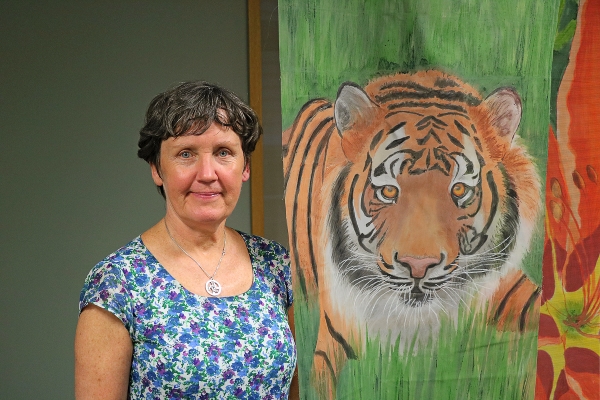by Martin de Jong
Sr Gail Worcelo used Laudato Si’ as a springboard to explore the environmental and cosmological concepts of Teilhard de Chardin, Thomas Berry and other Christian thinkers on our relationship to the earth and the “universe story”.
Sr Worcelo from Green Mountain Monastery in Vermont, United States, visited New Zealand in March to give a series of workshops “In the spirit of Laudato Si’”, at the invitation of Nga Whaea Atawhai o Aotearoa – Sisters of Mercy.
She co-founded Green Mountain Monastery as a monastic community dedicated to the healing of the earth with Thomas Berry (1914-2009): Passionist priest, cultural historian and ‘earth scholar’. The Wellington event with 50 other people.
Sr Worcelo explored the environmental and cosmological concepts in an experiential way with light body exercises to free up energy, and small group sharing. Consequently, a written account of the workshop is not going to give a full flavour of the event, but perhaps a reference to one of the poems she used will help. Quoting from Mary Oliver: “So come to the pond or the river of your imagination, or the harbour of your longing, Put your lips to the world and live your life”, she encouraged us to “put our lips to the world”.
Sr Worcelo noted that Laudato Si’ — Pope Francis’ ground-breaking 2015 encyclical on ecology — was “bookended” by St Francis of Assisi at the beginning and Jesuit geologist-priest Teilhard de Chardin at the end — in footnotes related to Pope Francis’ reference that the ultimate destiny of the universe is in the fullness of God, through the risen Christ.
Sr Worcelo noted that these two pioneers in our relationship with nature came from two quite different world views. The medieval world of St Francis saw the earth at the centre of the universe while the “evolutionary cosmology” of Teilhard de Chardin’s time sees the universe, including humanity, as continually unfolding.
Sr Worcelo explored de Chardin’s concepts of emergence and convergence. Emergence is the unfolding of the cosmos, while convergence is about “the deepening of being in a world of becoming”. De Chardin saw constant change in nature, and that the world and we with it are “always moving”. Even Christianity is an “emerging tradition”; it hasn’t remained static. However, Sr Worcelo said this “emergence” does not happen by reading a book — it’s something we need to participate it.
Although Fr Thomas Berry was not mentioned in Laudato Si’, Sr Worcelo considered that his cosmological thought was implicit through much of the encyclical. She used the workshop to expound on his understanding of what it means to live as a human being in our day and age.
Berry coined the term “Ecozoic”, which refers to a time when humans would treat the planet like a “house of life” — a concept echoed in Pope Francis referring to our earth as “our common home”.
Berry said to live in the Ecozoic healthily, we need to shift our thinking, and posited the principles to guide, some of which find echoes in Laudato Si’:
• The Earth is a communion of subjects, not a collection of objects.
• It is a one-time endowment, subject to an irreversible pattern.
• New ethical principles must emerge in the Ecozoic, to counter biocide and geocide — the killing off of other creatures, and the life-giving properties of the earth.
• All beings have rights: the right to be, the right to habitat, and right to fulfil its role in the great community of existence.
• According to Thomas Berry, “If you’re not uncomfortable, you’re probably not evolving”. Sr Worcelo proposed that human understanding of our relationship with the environment has passed through and evolved through five phases, with each phase caught up and continuing through the more recent phases, like an ever-upward and expanding spiral. She believed each of these five strains or phases is found in Laudato Si’:
• Animate or indigenous spirituality: expresses connectivity to the earth and spirits of nature.
• Custodial model, such as found in Benedictine spirituality, where our work with the earth is one caring for the earth.
• Fraternal model — as expressed by St Francis preaching to the birds.
• Sensual — as expressed by St Hildegard of Bingen who spoke of touching, tasting and feeling creation through our senses.
• Cosmological — relational, which covers our relationship with God, with each other, and with all other creatures with which we share this planet.

Reader Interactions